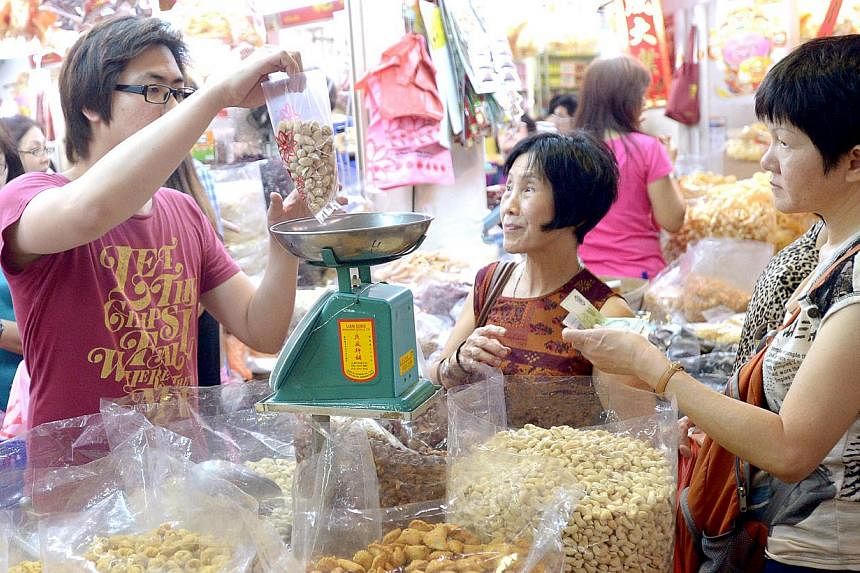The home-cooked reunion dinner next Wednesday will cost more this year, as Chinese New Year favourites such as fish maw and dried scallops have become more expensive.
Prices of these items - and mandarin oranges - have gone up by 10 per cent to 30 per cent compared to last year, said retailers and wholesalers.
Reasons for the price increases include a drop in supply due to overfishing or less rainfall, higher demand from restaurants and a stronger US dollar.

Meanwhile, prices of white-bellied fish, traditionally eaten during Chinese New Year, may rise from about $30 per kg this week to $80 a kg next week, said Mr Goh Thiam Chwee, vice-president of the Singapore Fish Merchants' General Association.
Some people believe that eating the fish while it is filled with roe will bring good luck. Spawning season, which usually lasts for a week each year, started on Tuesday, which means the supply of roe-filled white-bellied fish may drop by next week, pushing prices up, said Mr Goh.
But fans of abalone will cheer this year - the delicacy is 5 per cent to 15 per cent cheaper compared to last year, thanks to the ongoing corruption crackdown in China as expensive banquets, which commonly feature abalone, fall out of favour. At Sheng Siong supermarket here, prices of its house brand canned abalone have fallen by 5 per cent to 15 per cent.
Fish maw prices have been increasing every year due to falling supply from overfishing, said Ms Chow Qiu Rong, 31, whose family owns Teck Yin Soon Chinese Medical Hall in Chinatown. At the shop, big-sized fish maw costs upwards of $80 per 100g. Last year, the starting price was $70 per 100g.
Mr Jeff Poon, who owns seafood wholesaler Yau Shing, said prices are also being driven up by high demand from restaurants, which are increasingly substituting shark's fin with the lower-cost fish maw.
Dried scallops, an ingredient usually used in pen cai (a "treasure" pot filled with premium seafood), are 10 per cent to 15 per cent more expensive than last year. At Victoria Wholesale Centre, retailer Guan Say sells 100g of dried scallops from Japan at $29. The price hike is due to higher demand in the region, said store-in-charge Richard Chua, 55.
Prices of other Chinese New Year favourites, such as sea cucumbers and dried mushrooms, remain constant.
While consumers can save money by not having fish maw and dried scallops this Chinese New Year, mandarin oranges are a must in the celebration.
The fruit costs more per carton this year because it is traded in the US dollar, which has appreciated against the Singapore dollar, said wholesalers. Last Friday, S$1 could buy US$0.742, compared to US$0.789 a year ago.
Supermarket chain FairPrice said prices for fresh goods such as mandarin oranges have risen by 3 per cent to 5 per cent. At Sheng Siong, they cost 10 per cent to 20 per cent more.
Less rainfall in China has cut the fruit's harvest by 10 per cent to 20 per cent, contributing to the price hike, said Mr Tay Khiam Back, chairman of the Singapore Fruits and Vegetables Importers and Exporters Association.
At Bee Seng Fruit Supply, a carton of 20 of the popular lukan costs $16, compared to $14 last year, while a 38-piece box of the mainstay swatow variety costs $26, up from $23.
Price hikes or not, administrative officer Grace Tng, 42, who usually spends more than $500 on groceries for the reunion dinner, said she will buy the same quantity of food.
"My children love fish maw, so I will still buy, even though the price has increased. After all, the reunion dinner takes place just once a year," she said.


